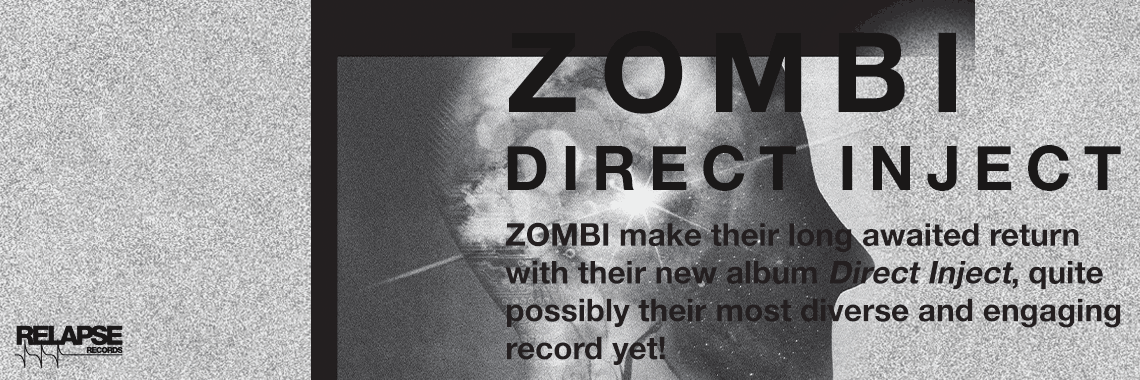** Chicago-based melodic death metallers (think: Children of Bodom meets Arsis meets Iron Maiden) Starkill are ready for world domination. New album, Virus of the Mind, is a significant step forward for the young bucks, blending black, death, and power metal together to form a sonic attack few have the wherewithal to pull off successfully. We chat with frontman/shred-god-in-the-making Parker Jameson.
Why are you excited for Virus of the Mind?
Parker Jameson: We’re excited to release Virus of the Mind because of how fresh and currently representative of us it is. We’ve added so many new elements and have grown and changed as a band, and all of this resulted in the production of a killer album.
What was writing Virus of the Mind like?
Parker Jameson: Unlike our first album (which contained many songs that were years old), this album, overall, took about a year or so of development to create. It was actually kind of unique in that there were various stages of refinement and writing, interrupted by stretches of touring. Last year we compiled lots of riffs we had written over the years, as well as several fresh brand new ideas, and made a tentative Top 10 list. Then, we started building the riffs into fully developed songs, adding lyrics and drums and key parts. Then we took a break to do the Krisiun/Arsis tour. Then we came back with a bunch of fresh ideas and added new things, and tweaked what we thought was previously good and made it even better. This same thing happened after we toured with Wintersun, Fleshgod Apocalypse, Amorphis, and Turisas. Being on the road with such incredible musicians and songwriters really shed light on newer directions we could take our relatively young style to. And, on top of that, two members of the band were replaced. So that also brought in two entirely new styles of writing to critique and contribute to the work we had already done.
Virus of the Mind is “darker”, right?
Parker Jameson: Virus has a darker mood for sure. Fires of Life had an overall theme of triumph and battle and conquest, but this album dropped that motif in favor of a more introspective and reflective vibe. The lyrical content is more melancholic and relatable to different people in different ways, the guitar work and drums were approached from a different angle, and most obvious of all is the introduction of clean vocals. That really opened up new doors… I know it’s cliché to call successive albums more mature, but I think that’s just the right word to describe the album.
Why did you decide to open up the vocal dynamic?
Parker Jameson: Some of my favorite metal bands like Nightwish, Wintersun, and Dimmu Borgir have awesome clean vocals and it’s always been something I wanted in our music, but I never really explored and experimented with my vocal style. Until very recently, I wasn’t comfortable recording it on record. Touring with Wintersun and watching Jari night after night planted some ideas in my head, but it wasn’t until we toured with Amorphis that I knew it absolutely had to happen and knew where Virus of the Mind was going. Not just Tomi’s vocals, but their entire sound inspired me to add new elements to our music. The voice is such a cool instrument, and it really allowed us to take listeners to a wider range of places.
What are your favorite songs at this point?
Parker Jameson: I think both the title track and Winter Desolation. I think they very successfully captured the things I had to say when writing them, musically and lyrically. Plus, the guitar solos are tasty.
What is the new album about lyrically?
Parker Jameson: The album title and title track take their name from an article by Richard Dawkins entitled “Viruses of the Mind”, in which he compares religious beliefs and activities to biological and computer viruses. It’s an interesting and thought provoking read, but the general idea is that, like viruses, concepts, such as religion and faith, can be spread from human to human, inducing activities such as unshakable faith in things despite total lack of evidence, aggressive behavior towards other faiths, and the idea that certain “mysteries” are not to be solved, but their insolubility is to be enjoyed. The title track is a reflection on the current world, where so many people are plagued by these mind viruses, being manipulated, and that more people need to view their own perceived controversies with an open mind and logically break down and assess their lifestyle. The other tracks generally contain ideas of facing and confronting personal struggle. The artwork really captures all of these ideas in a really surreal way, with a person entering her own mind to explore her thoughts, with all of her troubles, worries, and “viruses” (represented with the crown of thorns, fortresses, cobwebs, etc) surrounding her mind, making it a difficult journey.
What was it like working with engineer and producer Chuck Macak?
Parker Jameson: This was our second time in the studio with him, and it was super easy. He’s detail oriented, gets the best takes out of us, and had solid constructive criticism. Having been friends for the past two years and really knowing our style, he took the album exactly where we wanted it to go.
Any fun studio stories you want to share? OK, grueling stories, too.
Parker Jameson: In all honesty, it was a pretty smooth experience. We went in, took our time, and had a clear idea of what we wanted. There was serious recording business in one room, a SNES going in the other room, that was it for five weeks. The worst part was probably our studio diet of Ramen, Taco Bell, McChickens, and cheap beer… One little fact that’s cool is we got James Malone of Arsis to contribute vocals to a section on “Winter Desolation”. I hit him up after realizing his style of screams would fit really well, and he was nice to enough to contribute.
What does the classification of “shredder” mean to you and Starkill?
Parker Jameson: Fast. Guitar solos. Before I started listening to bands with singers, I was always listening to Paul Gilbert, Satriani, Malmsteen stuff, and to me I just think every song needs one solid solo. There’s a lot of incredible guitarists and bands with ridiculous fretwork going on all the time, but that to me sounds a little congested. I like verses, I like choruses, and I like dedicated sections of songs where the guitarist gets 20 to 60 seconds to unleash and be more intimate and up front in the mix. It’s just the equation that I like best for music.
Are there influences on your orchestral work? Soundtrack composers, Classical composers, etc.
Parker Jameson: I think on this album it was mostly passive. I do spend a lot of time listening to James Newton Howard, Michael Giacchino, James Horner, and that type of stuff. But on this record, I never started a project thinking “I’m going to go hardcore Hans Zimmer on this track”. This album is more guitar oriented than the last record, as well. “Skyward” and “Into Destiny” do have some pretty blatant Bach Baroque structured parts, though. Harpsichord always rocks. It brought a Hatebreeder-era Bodom feel to those tracks.
How do you think fans will react to Virus of the Mind?
It’s an incredible album. I think most people are going to love it. That said, I think a very small minority might be expecting Fires of Life 2. That’s not what we did. Fires of Life has already been done. We created something fresh and it’s exciting to have done so.
Wait, you’re already writing the follow-up to Virus of the Mind?
I can’t write on the road; it just doesn’t work. I have to have a DAW open and a keyboard and piano, so whenever we have time off, I am writing and recording. When Tony and Shaun joined the band, maybe 80% of the album was written. They helped a lot with the remainder, and polished the bits already there, but now we time to tackle the next project, and with a fresh start and fresh minds, we’ve already started writing some incredible tracks. The writing and recording never ends!
** Starkill’s new album, Virus of the Mind, is out now on Century Media Records. It’s available HERE.






